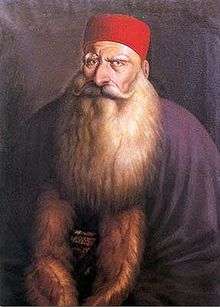
Bashir Shihab II
Bashir Shihab II (also spelt "Bachir Chehab II"; 2 January 1767–1850) was a Lebanese emir who ruled Lebanon in the first half of the 19th century. Having converted from Sunni Islam, the religion of previous Shihabi Emirs, he was the first and last Maronite ruler of the Emirate of Mount Lebanon.
Early life and family
Bashir was born in 1767 in Ghazir, a village in the Keserwan region of Mount Lebanon. He was the son of Qasim ibn Umar ibn Haydar ibn Husayn Shihab of the Shihab dynasty, which had inherited the super tax farm of Mount Lebanon, also known as the Mount Lebanon Emirate, from their Druze kinsmen, the Ma'an dynasty in 1697. Although the Shihab family was ostensibly Sunni Muslim, some members of the family had converted to the Maronite Catholic Church. Bashir was among the first members of his extended family to be born a Christian.
His father Qasim died when Bashir was still an infant, in 1768. Qasim's widow remarried, and Bashir and his elder brother Hasan were entrusted to the care of tutors and nannies. The children were raised in poverty and did not benefit from the privileges of a princely birth; their branch of the family was relatively poor. Bashir and Hasan developed feelings of mistrust from their childhoods that made them weary of their companions and of members of their own family. Leadership of Qasim's branch of the family was taken up by Hasan. The latter had a reputation for being cruel and aloof and was said to question people's affection for one another. Bashir, meanwhile, became a cunning, stubborn and clever opportunist who was more able control his temper and conceal his callousness. He sought out wealth working with his cousin Emir Yusuf in Deir al-Qamar, the virtual capital of Mount Lebanon, where he also gained an education.
Podcasts:

